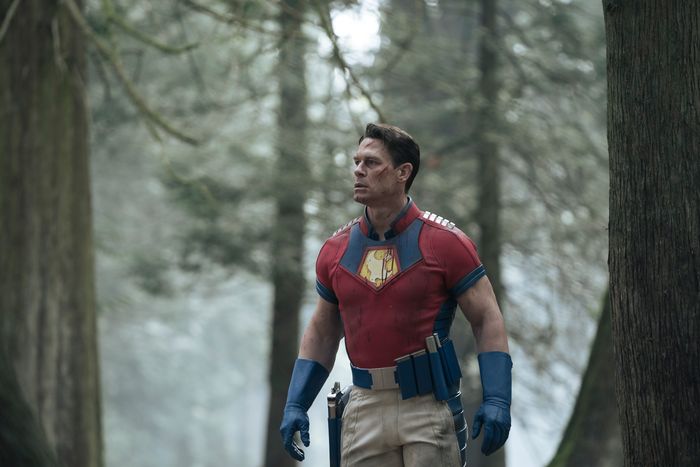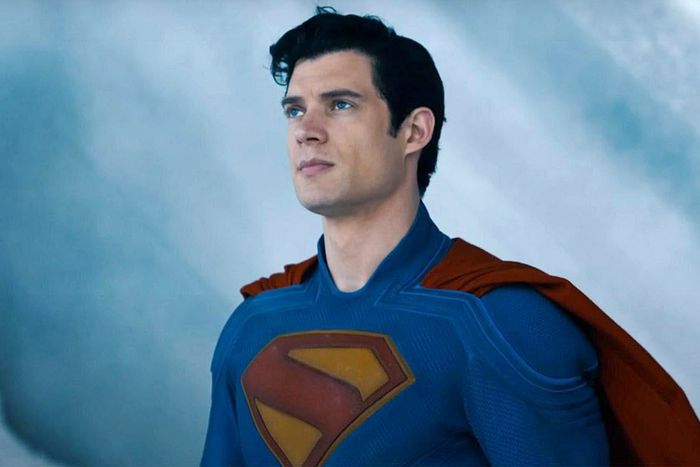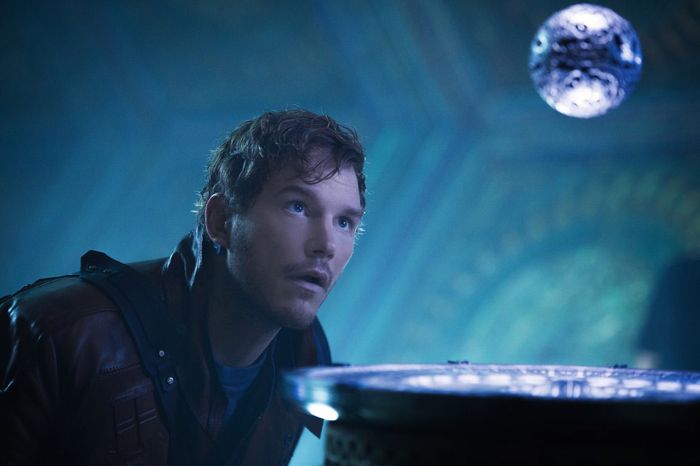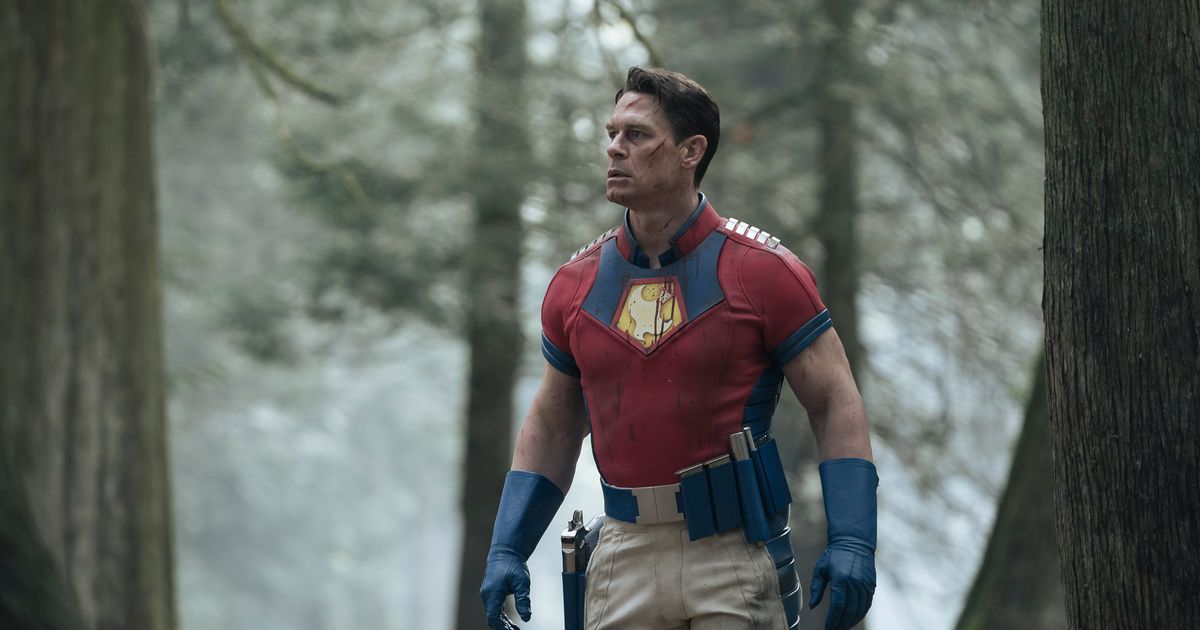



He is few critics’ idea of a respectable auteur, but his work is more consistently progressive than any other comic-book material today. Photo: Katie Yu/HBO Max
Did you hear about the hybrid American–Nazi Germany flag on display in a U.S. government office? You would have seen it in the September 25 episode of Peacemaker, the satirical HBO superhero drama from James Gunn. Or you would have read about it this month courtesy of Politico, which obtained a screenshot of a virtual meeting in which a U.S. flag “with altered red and white lines in the shape of a swastika“ could be seen in the office of an Ohio Republican representative. In the same week, Politico exposed a Telegram group chat in which Young Republican leaders praised Hitler and joked about the Holocaust, and President Donald Trump announced plans for a privately funded “triumphal arch” that looks like an unbuilt Albert Speer design.
Gunn’s recent work has seemed to anticipate recent events, whether it’s Peacemaker season two, which envisions a United States government overrun by Nazis who openly idolize Adolf Hitler, or his recent version of Superman, in which arch-villain Lex Luthor is a hybrid of Elon Musk, Patrick Bateman, and the current president. But Gunn is not a Cassandra of comics adaptations. He’s a storyteller who has a specific take on human nature, knows a bit about history and current events, and has figured out how to make a melodramatic statement without stinting on fight scenes, chases, heel turns, and other elements that superhero fans expect. He also happens to be working in a genre that has seesawed between democratic and authoritarian tendencies ever since the first superhero, Superman, debuted in June 1938. Gunn’s output embraces the former and aggressively critiques the latter. It has a more outspokenly progressive, at times utopian strain, than that of any other director making superhero films at the studio level.
Though he’s a power player now, he is few critics’ idea of a respectable auteur, and there are no signs that he seeks to be taken seriously as a creative or political force. Gunn started off working for B-movie distributor Troma on the Toxic Avenger franchise and has since been trusted with nine-figure budgets to make Disney’s Guardians of the Galaxy trilogy and instituted as co-chairman and CEO of Warner Bros.’s DC Studios. His adaptations have tried to tilt the comic-book image of America back toward the more inclusive national identity that it has haltingly pursued since the end of World War II — the war that was supposed to have established that fascism was bad and that patriotism shouldn’t be draped like a flag across the shoulders of bigots.
In this way, Gunn has little in common with his contemporaries’ superhero productions. These projects usually try to present themselves as nonpolitical, but their default settings are Fox News–coded cities where democratic government is corrupt or simply useless, street violence is rampant, and only extraordinary individuals from outside the system can restore order. See Christopher Nolan’s Dark Knight trilogy and Zack Snyder’s DCEU films, which for all their engrossing storytelling and visual splendors are militaristic fantasies of power and control with a splash of Ayn Randian exceptionalism. (You can track rising fascistic tendencies in the U.S. by studying the evolution of Batman, who went from a costumed detective in a cool car to an armor-plated commando driving a tank.)
In contrast, Gunn has perfected his own hope-punk version of older Hollywood studio pictures like Michael Curtiz’s Casablanca, Preston Sturges’s Sullivan’s Travels, Frank Capra’s Mr. Smith Goes to Washington and Meet John Doe, and John Ford’s The Battle of Midway. These works and others were made within a window that opened during President Franklin Delano Roosevelt’s New Deal and closed in the late 1940s when the surviving American troops came home, bringing their traumas with them. In the name of patriotism and strengthening shared values, these films extolled the humanist vision of democracy sold by Roosevelt, which insisted that people were more important than corporate profits (though with catastrophic missteps, including the internment of Japanese Americans after Pearl Harbor).
There have been superhero-driven projects that share Gunn’s penchant for social critique, graphic violence, and perverse humor, most notably the lively and clever Amazon series The Boys and its spinoff Gen V. But to quote Pajiba’s Tori Preston, they’re “nasty, nihilist punch-em-ups where everyone gets their hands dirty and the moral high ground is a fucking joke.” Even at its most sorrowful, anti-authoritarian, and smart-alecky, Gunn’s work endorses a fundamentally promising vision of life. Gallows humor and a keen bullshit detector are necessary for survival, but reflexive nihilism and blind obedience are deeply uncool. The ultimate rebellion is optimism.
Photo: Warner Bros.
Gunn’s Superman, written in 2022 (and partly modeled on the 2005–’08 series All-Star Superman), fiercely opposes the corruption of government by arrogant corporate leaders with God complexes, warns of the constitutional dangers of privatizing police and the military, and has the hero unabashedly stating that hope “is the real punk rock.” Gunn’s Superman is an immigrant who mirrors his adopted people’s best version of themselves and is shocked to learn that his supposedly saintly Kryptonian parents were actually warmongering colonizers who intended for him to rule Earth, not protect it. Luthor and various minor bad guys hate Superman because he makes goodness attractive, and it’s not an act: He really means it. He’s such a Pollyanna that he pauses during a city-wrecking battle with a giant monster to rescue an imperiled squirrel. An unreformed incarnation of Peacemaker who has a bit part in the movie whines that Supes “thinks he’s better than everybody else, makes this declaration he’s against killing people unless it’s absolutely necessary! Really, dude? It kinda sounds like you’re trying to make the guys who are a little edgier than you look like jerks.”
Gunn’s version of Luthor (Nicholas Hoult) is similarly of the moment: an immigrant-hating billionaire who decides his wealth entitles him to influence governments. He’s an amalgamation of post-Reagan Republican ideals, with bits of Elon Musk and Mark Zuckerberg. But he specifically reflects the values of George W. Bush — whose administration birthed not just the DHS and Guantánamo Bay but the USA Patriot Act — and Trump, whose second term brought public kidnappings by masked men and the construction of facilities described by human-rights watchdogs as concentration camps. Gunn’s Luther uses LexCorp’s proprietary interdimensional portal technology to host his own privately funded internment zone, a sci-fi version of what is known in intelligence circles as a “black site” — a place where prisoners can be indefinitely detained beyond the reach of Congress or the domestic court system and abused with impunity. The $200 million blockbuster Superman was released eight days after the opening of so-called Alligator Alcatraz in Florida and on the same day that a federal court paused Trump’s order ending birthright citizenship.
Before Superman, there was Peacemaker, a.k.a. Chris Smith. The character made his screen debut in Gunn’s 2021 action comedy The Suicide Squad, which follows human and metahuman mercenaries dispatched by government boss Amanda Waller (Viola Davis) to depose the president of a fictional island nation, Corto Maltese — who himself had deposed his predecessor in a coup and was a grifter faking interest in democracy. It was shot in 2020, but the story foreshadows events that occurred during its release year (2021) in Guinea, Southeastern Nigeria, Myanmar, and Sudan. Season one of Peacemaker, a Suicide Squad follow-up, began production on January 15, 2021, and ran on HBO in early 2022. The series is about the rehabilitation of the title character, Chris, a self-styled super-patriot who drank the right-wing Kool-Aid practically at birth. He does whatever his leaders tell him to do and shrugs off human-rights concerns as sissy stuff. “I cherish peace with all of my heart,” he declares, “and I don’t care how many men, women, and children I kill to get it.” Peacemaker, which went in front of the cameras nine days after the January 6 insurrection, shows how hard it is to deprogram authoritarian beliefs and learn to equate empathy with might.
In Peacemaker’s season-two September 25 episode, when the Nazi Stars and Stripes are discovered on a desk in the offices of the federal agency A.R.G.U.S., the twist transforms a Norman Rockwell vision of 21st-century suburbia into a homegrown Nazi nightmare. It takes place in an alternative dimension Chris accessed via his late father Auggie’s secret room of portals — a dimension in which, Chris says, everything is “perfect.” Here, Auggie is alive as a more decent person, and Chris’s younger brother Kevin, who Chris accidentally killed in a childhood fight orchestrated by Auggie, is also alive and well and played by David Denman, fighting side by side with dad in superhero garb. Kevin’s death in the other dimension made Chris feel evil and worthless and drove him to seek affirmation from an all-powerful bad-daddy substitute, the U.S. military. This new dimension gives him a chance (or so he believes) to pretend the tragedies of the other place never happened and reinvent himself as a happy, useful hero who’s respected by all. That Chris immediately killed his own evil doppelgänger upon entering the Nazi dimension is an ironic sick joke: He’s always had imposter syndrome, and now he literally is one.
Chris’s ex-girlfriend Emilia Harcourt (Jennifer Holland), a blonde white woman who could’ve been cast in a Leni Riefenstahl propaganda picture, eventually comes through the portal to rescue Chris by impersonating her same-named counterpart, a tradwife. Elsewhere in Naziville, one of Chris’s pals from the other world, Leota Adebayo (Danielle Brooks), is being chased by a white mob that includes Kevin. She is saved from being lynched by another visitor to the Nazi dimension, the costumed vigilante Judomaster (Nhut Le). Back home, Judomaster was as obedient to authority as Chris is. In this new world, he immediately realizes that “you don’t wanna be a minority or gay or a Buddhist or anything else I am, really.” It is implied that Chris overlooked obvious tells in the Nazi-flavored otherworld, including a Hitler mural on an office wall and an overwhelmingly melanin-challenged citizenry. The acknowledgment of privilege and the rebuke of its self-serving justifications for oppression is another motif in Gunn’s work. In a surprising — and for some, anticlimactic — season ender, Chris and company leave this Nazi dimension emboldened to fight against the patriarchal monolith of their own world. This is consistent with Gunn’s demonstrated belief in the moral necessity of resisting authoritarian principles from within organizations that enforce them or rejecting them and suffering the consequences, because to lose one’s soul is worse.
Photo: Jay Maidment/Marvel
In The Suicide Squad, for instance, invasion team leader Rick Flag (Joel Kinnaman) maintains a “shut up and do the job” mentality as in the movie that introduced him, David Ayer’s 2016 Suicide Squad. But then it’s revealed that his team’s mission to depose an oppressive leader in the fictional Latin American island nation of Corto Maltese is a cover story for the U.S. government’s real agenda: to seize the results of a long-running experiment involving mind control by extraterrestrial “Starfish.” The mastermind of the experiment, a Dr. Mengele–like scientist known as The Thinker (Peter Capaldi), tells Flag that the U.S.-sanctioned experiments involved civilian men, women, and children as well as the political enemies of various Corto Maltese regimes. The appalled Flag states, “I went into the military to save my country, not to be its puppet.” He resolves to leak a hard drive containing proof of the experiments to the press and is killed by the loudly “patriotic” Chris.
When I interviewed Gunn after Peacemaker’s season-one finale, he said “Peacemaker is about what’s going on in America, but it’s more about what’s going on within America’s people than within the government itself.” He added that he did the series because John Cena showed more depth as an actor in Suicide Squad than he’d previously thought him capable of — and it just so happened that Cena’s character was the only one in the movie “who did not have a positive arc … He actually is a pretty bad guy. Being able to see how he got that way and where he could possibly go was exciting.” But most of Gunn’s comic-book-themed work has characters like Peacemaker, who are regarded (and often see themselves) as spineless followers or defective individuals who improve themselves by opening up to love and friendship and finding a sense of purpose by helping oppressed groups. Idris Elba’s The Suicide Squad super-soldier, Bloodsport, is a broken man who doesn’t want to get involved in any more missions. He blames himself for his teenage daughter’s run-ins with the law (she blames him, too) and accepts the Corto Maltese mission only because A.R.G.U.S. boss Amanda Waller threatens to send his daughter to prison if he refuses. Bloodsport agrees and eventually confirms that he is, indeed, an excellent leader as well as a worthy father by bonding with Ratcatcher 2 (Daniela Melchior), a young woman who learned to control rats from her own father, a drug addict who died of an overdose.
Gunn’s animated HBO show Creature Commandos is filled with characters enacting their own versions of the zero-to-hero journey. The eponymous squad consists of metahumans and supernatural beings who spent time in a military prison after being abused and vilified. They’re forced to join a suicidal mission to another fictional country, Pokolistan, to kill the country’s leader, Princess Ilana Rostovic (Maria Bakalova). Ilana presents herself as a stout-hearted reformer who’s being targeted by fascistic insurgents but is secretly evil enough to engineer an apocalypse. If the squad succeeds and its members survive, they’ll get a bit of mercy from the government, plus personal redemption, if they’re into that sort of thing. In eight episodes built around flashbacks, we get to know powerful yet vulnerable characters including flame-throwing ex-scientist Dr. Phosphorous (Alan Tudyk), whose condition was inflicted by gangster patrons who killed his wife as punishment for his rebellion; and the Bride of Frankenstein (Indira Varma), who was sexually exploited by her scientist “father” and has been stalked for centuries by the monster (David Harbour) she was created to mate with.
In story after story, Gunn’s characters question their conditioning, slough off past traumas, and assert their independence. The process is consistently agonizing and often profoundly sad. But it’s also inspiring in its message that every being deserves love and dignity even when they’re not classified as human, let alone American. The only beings exempt from Gunn’s compassionate gaze are authoritarians of any nationality or species. This maxim is laid out in the origin story of another of the Creature Commandos, G.I. Robot (Sean Gunn), who was invented to hunt Nazis in World War II but was jailed after the war for massacring a bar full of American Nazis; James Gunn’s script makes it clear that a Nazi is a Nazi no matter where they’re from and must be killed without hesitation.
Gunn’s filmography didn’t always display such stark moral and political clarity. His first take on superhero mythology, the 2010 film Super, starring Rainn Wilson as Frank Darbo, a comic-book-obsessed, middle-aged diner cook and devout Christian who takes in a drug addict named Sarah (Liv Tyler), sticks by her as she gets clean, then accepts her marriage proposal only to lose her to the local drug boss (Kevin Bacon) who gets her hooked again. Acting on what Frank believes is divine orders (but is actually a hallucination he had while watching a Christian-themed superhero show called The Holy Avenger), he creates an alternate identity, The Crimson Bolt, a vigilante in a crude homemade costume who bashes street criminals with a pipe wrench. Echoing Alan Moore and Dave Gibbons’s Watchmen, it views costumed heroes and villains as unhinged people wearing their issues on their bodies. Frank feels emasculated by everyone and everything. Evangelical fervor is to him as spinach is to Popeye, emboldening him to try to save a woman who didn’t ask to be saved and fight crime by committing a string of assaults. He grows so deranged that he dons his Crimson Bolt outfit to crack the skull of a jerk who cut in line in front of him at a movie theater, then strikes the man’s girlfriend when she tries to intervene. Like Taxi Driver, the movie it most resembles, Super ends on an ambivalent note with Frank continuing to see himself as a hero rather than pitiable loner with violent urges who stumbled into a series of events that validated his delusions. It’s the only Gunn project that could be considered a tragedy, because the main character fails to see beyond his pain-fueled self-deceptions and enlighten himself.
Super marked the end of something in Gunn’s identity as a storyteller. Previous films he’d written — including his directorial debut, 2006’s Slither, and Zack Snyder’s 2004 Dawn of the Dead — had a mysteriously bright energy even when the onscreen action was subversive, punkish, or horrific. But those remakes are about hive-mind monsters infecting and possessing humans, who valiantly resist but fail to eradicate the threat. The threat is inhuman and external, and Gunn finds a certain sick humor in its inevitable victory over humankind. Gunn’s script for 2016’s The Belko Experiment similarly ends on a pessimistic note that’s common in horror cinema. Employees of the Belko corporation are locked in a facility and warned that if they don’t murder 30 of their own colleagues, 60 will be murdered by their captors. They split into two factions, one led by Barry (Tony Goldwyn), the company’s COO and an ex–Special Forces soldier, who is willing to play along to save his own skin, and Mike (John Gallagher Jr.), who refuses. Mike eventually survives at the expense of his own principles, but then it’s revealed that what he just endured was phase one of a larger experiment in which he’s still a subject.
Gunn the cockeyed empathetic optimist didn’t make his public debut until the first Guardians of the Galaxy. That film and its two sequels showcase plots and subplots in which misguided and/or mistreated outsiders break free of their enforced identities, overcome grievances that limited their potential, create new families based on friendship and common cause, and always side with the underdog even when the smart play would be to keep moving. The cast of humans, nonhumans, and metahumans aren’t technically superheroes (though they sort of became deputized Avengers in the two Endgame movies), but the trilogy was close enough to serve as a workshop for Gunn to perfect a self-mocking but deeply sincere approach that he’d import to DC. Gunn has stayed loyal to that sensibility ever since. The post-Super movies have more complex, contradictory characters but less ambiguity about what’s right (egalitarian societies in which every citizen has a voice) and what’s wrong (cultlike obedience to fascistic belief systems that have no interest in anything but domination and self-enrichment). They present body snatching and other corporeal takeovers as metaphors for the way authoritarianism spreads through societies like an ideological parasite, building power by jumping from one receptive host to another.
But now we’re facing a Gunn-less stretch of popular culture: Beyond the DC projects he’s producing, his only 2026 credit is for contributing to the story for Coyote vs. Acme, the once shelved and now resurrected live-action Looney Tunes movie. Of course it’s possible that his time at the top of DC could end sooner, especially if Warner Bros. ends up being sold: Nothing lasts forever, especially in Hollywood. But he’s had an extraordinary run so far, evolving into a rare popular artist who can weave humanistic, politically progressive themes into blockbusters aimed at a global audience without making them feel like they paid for candy but got handed fiber pills. It’s a neat trick that isn’t new but has become less commonplace during an era in which blockbusters increasingly stand for nothing but intellectual-property maintenance. When the country’s noblest values are being torn down with a wrecking ball, Gunn is earnestly telling stories that try to build them up, insisting that in a time of rising despair, hope is still punk rock.
Source link

اترك تعليقاً